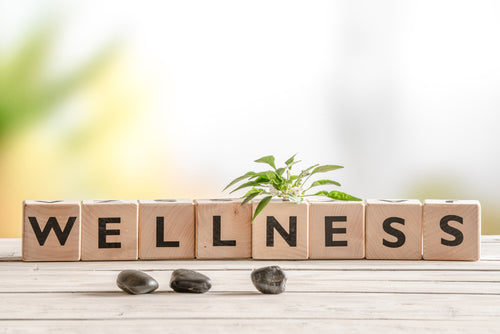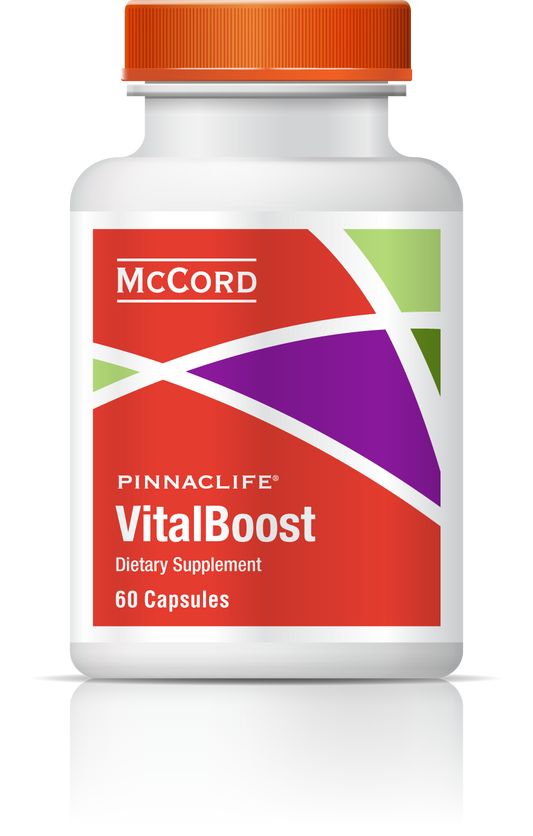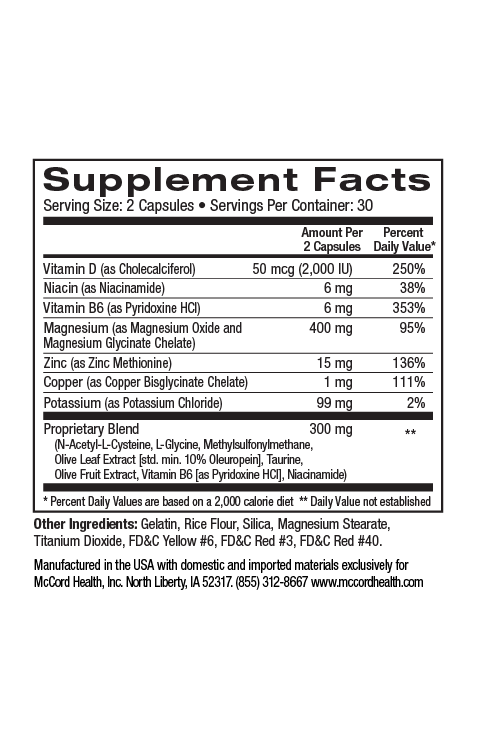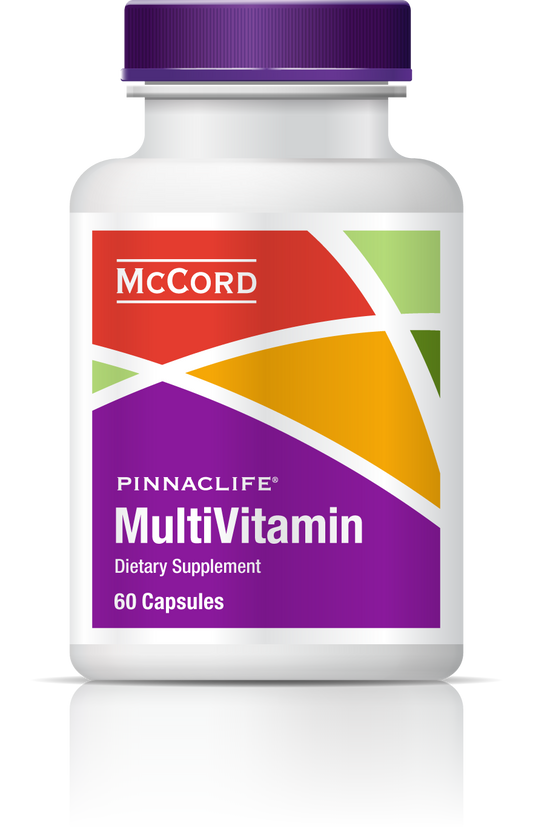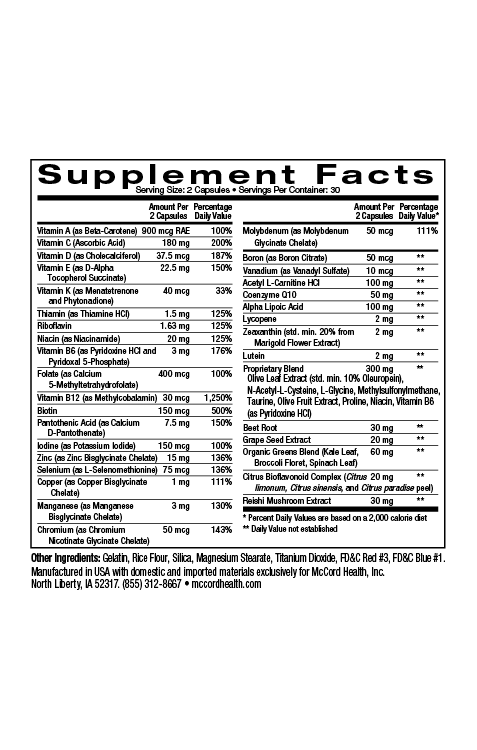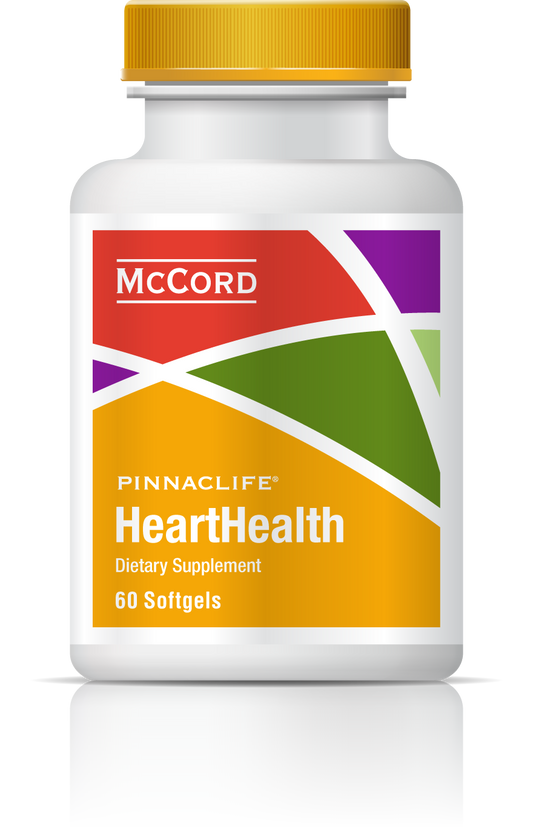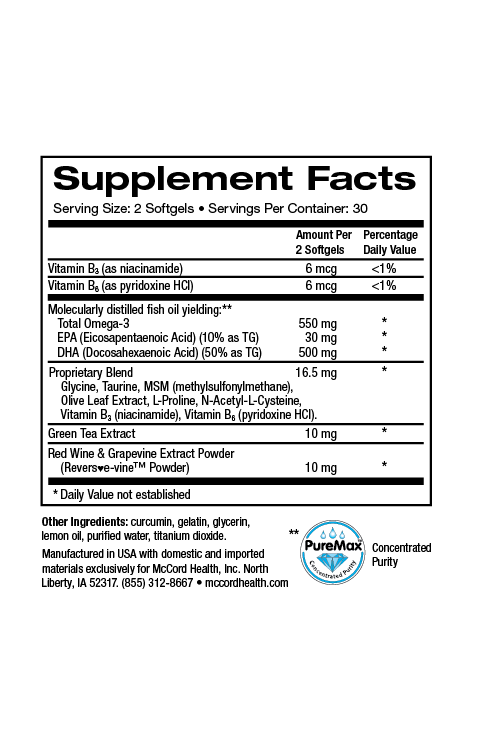Feel Better by Living Healthy
Every new year many of us make resolutions focused on healthier living. For many, that means changing certain habits (good or bad), increasing physical activity, and eating a healthier diet. But we know it can be hard to stick to some of the resolutions – otherwise we wouldn’t be making them every year! Yet people continue to make commitments to healthier living because we know that we tend to feel a lot better when our bodies are healthy.
The McCord Research Pinnaclife team is dedicated to helping people on the path to healthier and happier living and it is our goal to provide you with tools to help you on your journey – whether in the form of our nutritional supplements or just in quality health information. So here is some general information that we hope you find helpful throughout your journey to better health.
Start Low and Go Slow
These are good words to live by for a lot of things - but especially when related to things like diet, exercise, supplements, and medications. One of the biggest contributors to failed lifestyle changes is that people try too much too fast and either hurt themselves or get overwhelmed and burn out.

If you haven't been working out for a long time, don't just just straight into an intense program that has you working out 5+ days a week for hours at a time - you're setting yourself up for injury and failure. Start low - go slow! Start increasing your physical activity over several weeks, walking more, stretching, slowly increasing speed, etc.
You want to eat healthier? Keep it simple! You can make tremendous progress just by focusing on eating more natural foods, especially vegetables, and cutting out processed foods - especially refined sugars. You don't need to jump head first into ketogenic, Whole 30, gluten-free, vegan, etc, etc. Start low and go slow!
As you start to incorporate more healthy vegetables and eliminate refined sugars you can start looking at next steps. The whole point is to make lasting changes - not temporary fixes. Set yourself up for long-term success!
As always, you should discuss your diet, exercise, and/or decision to use nutritional supplements with a trusted and licensed health care provider that has a working knowledge on the use of nutritional supplements and is familiar with your own personal medical history.
Your Body Responds to the Nutrients You Feed It

Many healthcare providers, including myself, would say that a healthy diet is the most important aspect of healthy living. As they say, you are what you eat – literally – your body is built from the ingredients you consume. You cannot expect to build a healthy body unless you are actively providing it with the materials it needs. If one of your goals is to “build a new and healthier you,” it would make sense that you pay attention to the nutrients you are (or aren’t) consuming.
Healthier Living Means Eating Enough Nutrients
Remember that a healthy diet doesn’t just mean eating less. It’s not just about calories, carbs, fats, fiber, and protein. We need to always be conscious of the micronutrients – the vitamins, minerals, and antioxidants – that your cells need to thrive.
You can eat a low calorie, low fat, low carb diet that is completely void of the nutrients your body needs and while you may lose weight, you are not on a path to healthy living because you are not feeding your body what it needs. This type of restrictive approach to healthy eating often leaves people feeling hungry, unsatisfied, tired, and malnourished because it lacks micronutrients.
High quality supplements may help you reach your nutritional goals
It is best to naturally obtain micronutrients and fiber from your diet, however we understand that it is not always possible, practical, or economical for people to do so.1,2 So we encourage the use of nutritional supplements in combination with a healthy diet to make sure you provide your body with all the tools it needs daily. Increasing your daily intake of micronutrients and fiber may also help curb food cravings, hunger pangs, and overeating while improving feelings of fullness (satiety).3–5
Consider incorporating Olivamine Essentials into your daily routine to provide your body with a solid nutritional basis every day, even when you might slip a little bit on your healthy diet. The Olivamine Essentials include:
- Antioxidant Support from Olivamine ImmuneHealth
- A boost of vitality from Olivamine VitalBoost
- Balanced nutrition from Olivamine MultiVitamin
- Dietary fiber from DigestiveHealth Prebiotic Fiber
Healthier Living Through Exercise
Visit any gym in January and you’ll see just how many people intend to increase their physical activity in the new year. But jumping head first into an over-the-top workout program without properly preparing your body to handle the strenuous activity can create problems.
Increasing physical activity too aggressively when your body is ill-prepared can be damaging not just because of physical injuries, but also on a cellular level as the body has to deal with increased metabolic waste and free-radicals.6–9 This problem is amplified if you are following a restrictive diet plan and selecting inappropriate foods that are not just low on calories, but also low on micronutrients including vitamins, minerals, and antioxidants.
When you start increasing your workout regimen, it is important to give your body adequate nutritional support.6–9 Consider incorporating some of the following nutrients to provide your body a wide variety of nutrients known to keep your body running at an optimal level, especially during increased physical activity:
- Antioxidant Support from the patented Olivamine providing olive leaf and olive fruit extracts, N-acetyl-l-cysteine, taurine, B Vitamins, and more
- Support healthy levels of inflammation and keep your joints moving with the combination of Olivamine with additional MSM and curcumin
- Support a healthy heart and cardiovascular system with high purity concentrated essential Omega-3 fatty acids DHA and EPA
- Provide your cells with support to give them a boost of energy
Get More Restful Sleep
It’s well established that most people do not get enough quality sleep on a routine basis.10,11 There are a lot of steps you can take to improve overall sleep quality, and help you get the recommended 7-9 hours of sleep. Turning off the TV and going to bed at a regular time every night are common resolutions people make that can certainly help, however it is sometimes difficult to change your routine.
Healthy sleep habits include:
- Get the room as dark as possible
- Turn off the TV and put the phone away
- Try to stick to the same bedtime every night
- Only use the bedroom for sleeping and intimacy
- Incorporate relaxing calming activities before bed to help wind down
- Get outside into natural lighting during the daytime
- Get daily exercise, but not right before bedtime
- Turn down the thermostat at night
- Avoid stimulants like caffeine too late in the day
- Limit daytime naps to less than 30 minutes
- Avoid rich, fatty, and spicy foods before bedtime as well as carbonated drinks as they can all contribute to heartburn when you lay down
- Avoid alcohol, nicotine, sugar, or other drugs
- Make the sleeping room as comfortable as possible
- Invest in a good bed - you'll spend 1/3 of your life sleeping, you might as well be comfortable!
Melatonin for Promoting Healthy Sleep
If you are trying to get your body into a regular sleep pattern you can adopt a number of the tips listed above, and you may also find it helpful to incorporate melatonin using it at the same time every evening – about 30 minutes before you would like to fall asleep.12–14
Melatonin is responsible for regulating your sleep and wake cycles (circadian rhythm) and can be a safe and effective way to promote a regular sleep pattern.12,15 You should avoid using antihistamine and stronger prescription sleep aids as the sleep they produce is not the quality REM-sleep that you need, they can be addictive, and they have been associated with long-term effects such as cognitive impairment, dementia, and even Alzheimer’s especially with prolonged or repeated use.16–18
Consider trying Proprietary Blend SleepHealth to provide a safe and effective 2 mg dose of melatonin, plus the calming and relaxing effects from magnesium and curcumin.19–22 Antioxidant support from Olivamine ImmuneHealth is also beneficial at this critical “rest and repair” phase to help your body recover from the stress of the day.
Follow Safe Supplementation Practices
We hope that this new year you can stick to your resolutions, and make some meaningful lifestyle changes to improve your overall health status. We think that McCord Research Proprietary Blend supplements can play an important role in helping you accomplish your goals.
If you choose to include dietary supplements in your routine, it is important to find products that you can trust to be safe and effective – using quality ingredients with a long history of safe and effective use, and science to support their health benefits. Always ask yourself what you expect the supplement to accomplish and if your expectations are reasonable. Generally, if something sounds too good to be true - it probably is - so when you see "lose weight fast without changing your diet or exercise" you should definitely be skeptical!
Always check with your personal doctor / pharmacist / medical professional before adding a nutritional supplement to your routine, especially if you are currently using prescription medications or have chronic medical conditions.
References
- United States Department of Agriculture. Access to Affordable and Nutritious Food: Measuring and Understanding Food Deserts and Their Consequences: Report to Congress. (Ver Ploeg M, ed.). DIANE Publishing; 2010.
- Walker RE, Keane CR, Burke JG. Disparities and access to healthy food in the United States: A review of food deserts literature. Health Place. 2010;16(5):876-884.
- Fuhrman J, Sarter B, Glaser D, Acocella S. Changing perceptions of hunger on a high nutrient density diet. Nutr J. 2010;9(51):1-13.
- Rolls ET. Brain mechanisms underlying flavour and appetite. Phil Trans R Soc B. 2006;361:1123-1136.
- Williams RA, Roe LS, Rolls BJ. Assessment of satiety depends on the energy density and portion size of the test meal. Obes (Silver Spring). 2014;22(2):318-324.
- Viña J, Gomez-Cabrera MC, Lloret a, et al. Free radicals in exhaustive physical exercise: mechanism of production, and protection by antioxidants. IUBMB Life. 2001;50(4-5):271-277.
- Sen CK. Glutathione homeostasis in response to exercise training and nutritional supplements. Mol Cell Biochem. 1999;196(1-2):31-42.
- Leeuwenburgh C, Heinecke JW. Oxidative stress and antioxidants in exercise. Curr Med Chem. 2001;8(7):829-838.
- Ji LL, Leichtweis S. Exercise and oxidative stress: Sources of free radicals and their impact on antioxidant systems. Age (Omaha). 1997;20:91-106.
- Centers for Disease Control and Prevention. National Sleep Awareness Week Unhealthy Sleep-Related Behaviors. MMWR. 2011;60(8):1-36.
- Irwin MR. Why Sleep Is Important for Health: A Psychoneuroimmunology Perspective. Annu Rev Psychol. 2014;66:143-172.
- Lewy AJ. Clinical applications of melatonin in circadian disorders. Dialogues Clin Neurosci. 2003;5(4):399-413.
- Zeitzer JM, Duffy JF, Lockley SW, Dijk D, Czeisler CA. Plasma Melatonin Rhythms In Young and Older Humans During Sleep , Sleep Deprivation , and Wake. Sleep. 2007;30(11):1437-1443.
- Brown GM, Ph D, Frcp C. Light , Melatonin and the Sleep-Wake Cycle. J Psychiatr Neurosci. 1994;19(5):345-353.
- van Geijlswijk IM, Korzilius HPLM, Smits MG. The use of exogenous melatonin in delayed sleep phase disorder: a meta-analysis. Sleep. 2010;33(12):1605-1614.
- Chen P-L, Lee W-J, Sun W-Z, Oyang Y-J, Fuh J-L. Risk of dementia in patients with insomnia and long-term use of hypnotics: a population-based retrospective cohort study. PLoS One. 2012;7(11):e49113.
- Meoli AL, Rosen C, Kristo D, et al. Oral Nonprescription Treatment for Insomnia : An Evaluation of Products With Limited Evidence. J Clin Sleep Med. 2005;1(2):173-187.
- Gray SL, Anderson ML, Dublin S, et al. Cumulative Use of Strong Anticholinergic Medications and Incident Dementia. JAMA Intern Med. 2015;175(3):401-407.
- Chollet D, Franken P, Raffin Y, et al. Magnesium involvement in sleep: genetic and nutritional models. Behav Genet. 2001;31(5):413-425.
- Abbasi B, Kimiagar M, Sadeghniiat K, Shirazi MM, Hedayati M, Rashidkhani B. The effect of magnesium supplementation on primary insomnia in elderly: A double-blind placebo-controlled clinical trial. J Res Med Sci. 2012;17(12):1161-1169.
- Noorafshan A, Abdollahifar M-A, Karbalay-Doust S, Asadi-Golshan R, Rashidian-Rashidabadi A. Protective effects of curcumin and sertraline on the behavioral changes in chronic variable stress-induced rats. Exp Neurobiol. 2013;22(2):96-106.
- Xu Y, Ku B, Tie L, et al. Curcumin reverses the effects of chronic stress on behavior, the HPA axis, BDNF expression and phosphorylation of CREB. Brain Res. 2006;1122(1):56-64.
